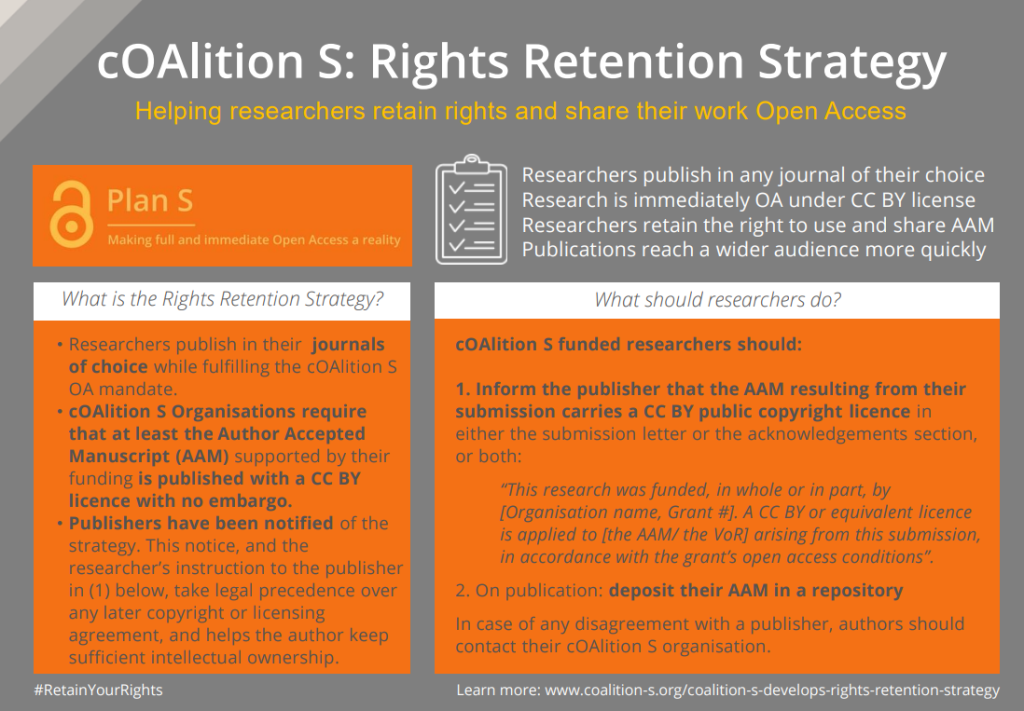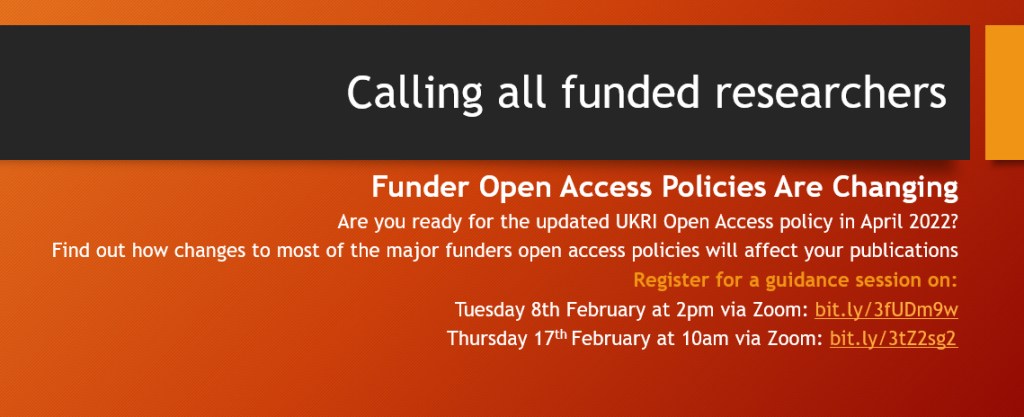Several funders are revising Open Access (OA) requirements for peer reviewed research and Swansea University authors are encouraged to familiarise themselves with any OA policy that applies to their work.
For all disciplines, funded research articles need to be open access immediately upon publication via the green or gold OA route to improve the availability and impact of research .This ambitious change is part of a transitional shift towards sustainable and equitable open access. Wellcome and cOAlition S Funders endorsed this policy in 2021 and further funder alignment is imminent:
2022:
UKRI, AHRC, BBSRC, EPSRC, ESRC, MRC, NERC, STFC. (From 1 April 2022 – journal articles/reviews/conference proceedings with ISSN, or publishing platform)
NIHR, National Institute for Health Research (From 1 June 2022)
CRUK, Cancer Research UK (From 1 January 2022)
2024:
UKRI (From 1 January 2024 – monographs/ book chapters/ edited collections)
What is the Rights Retention strategy?
The Rights Retention Strategy (RRS) devised by cOAlition S has been introduced to ensure that funded research is subject to an open licence that allows researchers to retain the right to use and share their work.

There are two routes to funder compliance:
- Gold open access route 1: final published version of record (VOR) document on a journal website or publishing platform with a Creative Commons CC-BY attribution licence or equivalent*.
- Green self-archiving route 2: researchers publish in a hybrid (subscription + open access) or subscription journal. When an author submits a paper using this route, the manuscript should include a statement indicating that the author will apply a Creative Commons attribution (CC-BY) licence or equivalent* to any author accepted manuscript (AAM) resulting from peer-review. The AAM will be released in the repository with no embargo and means that your article is freely available to read without a paywall upon publication. Green open access is the preferred route for making outputs available as it is cost free.
* Open government licence (OGL) to any AAM subject to Crown Copyright. By exception some funders permit Creative Commons Attribution No Derivatives (CC-BY-ND).
Publishers have been notified of the rights retention strategy for self-archiving in repositories by the large funders. However, there are some publishers like Springer Nature that will not permit the AAM to be shared or distributed under a creative commons licence when self-archiving papers published in subscription journals. They expect authors to agree to a publishing licence that includes an embargo period. If a publisher refuses to honour rights retention you may wish to seek an alternative publication venue or route to publication in order to meet funder open access requirements.
Journal Checker Tool: https://journalcheckertool.org/
Add journal title + Funder name + Swansea University to view Plan S compliance status.
Sherpa Fact is also available: https://v2.sherpa.ac.uk/fact/
Add journal title + Funder name
You will also find a list of funder open access policy conditions on our research handbook.
What does an author need to do to ensure funder open access compliance?
Route 1. Open Access Publisher Agreements (gold)
Swansea University has purchased agreements with some publishers to enable corresponding authors to publish their work open access at no additional cost. A list of transitional agreements (TA) is available from the Effective Research Publishing Handbook. These include selected titles from CUP, OUP, IOPScience, BMJ, PLOS, Springer, Taylor & Francis and Wiley. We also have membership schemes for discounted fees with SAGE, MDPI and ACS. By April, the current Swansea University UKRI open access block grant webpage for financial support, will be updated for hybrid journal payment applications that are not part of a Swansea University transitional publisher agreement. We can also support publication in other fully open access journals and platforms. For journals that do not meet the sector requirements for transition to open access authors will need to use alternative funding for payment of open access fees.
We emphasise that authors can still choose to publish in hybrid journals that are not part of a transitional agreement, or where their research organisation is not a participant in an existing transitional agreement. Authors can be compliant with UKRI’s open access policy either via self-archiving in a repository (where a journal accepts submissions acknowledging UKRI) or by using other funding sources for article processing charges.
UKRI Open Access Policy – explanation of policy changes 08/2021
Route 2. Open Access via self-archiving in a repository (green)
- Upon submission, the author informs the publisher that the accepted manuscript (AAM) arising from the submission is licensed CC-BY in accordance with the grant’s open access condition. You can use this form of words in the acknowledgment section.
“This research was funded, in whole or in part, by [Organisation name, Grant #]. A CC-BY or equivalent licence is applied to [the AAM / the VoR] arising from this submission, in accordance with the grant’s open access conditions’’
- Upon acceptance following peer review, deposit the AAM in the Research Information System (RIS). RIS will be updated to capture rights retention activity and the AAM or VOR where the publisher permits will be released in Cronfa with no embargo upon first publication.
- UKRI require a data access statement even where there are no data associated with the article or the data are inaccessible.
- Your funder may require a Europe PubMed Central (EuropePMC) deposit. Most publishers complete this step automatically for biomedical research articles that acknowledge MRC or BBSRC funding.
Key Takeaway
Route 1 – Check if there is an institutional TA publisher deal available to remove open access costs.
Route 2 – Use the rights retention statement at the point of submission. The elimination of embargoes and the use of open licensing will enable self-archived accepted manuscripts to be freely available in the repository upon publication.
Book Publishing
- There is an expectation that UKRI researchers will make monographs, book chapters and edited collections published from 1 January 2024 open access within 12 months of publication. Some exceptions apply (Point 17. UKRI)
- A CC-BY attribution license is required unless an exemption has been obtained in writing from UKRI to use an alternative creative commons license.
- A ring-fenced block grant will be provided to the sector to support UKRI monograph publishing.
- Policy exceptions apply to scholarly editions, textbooks and trade books.
Register for a short information session.
The focus will be on changes to the UKRI policy.
- Tuesday 8th February at 2pm via Zoom: https://swansea-uk.libcal.com/event/3827560
- Thursday 17th February at 10am via Zoom: https://swansea-uk.libcal.com/event/3827562
We will be running additional sessions throughout March and April (dates tbc).
- Quick Links
- UKRI Open Access Policy, April 2022
- NIHR Open Access Policy June 2022
- Wellcome Open Access Policy 2021
- cOAlition S FAQs
- cOAlition S Handout Flyer
- Creative Commons Licensing
- Swansea University Publisher Agreements and Memberships
- Swansea University UKRI Open Access Financial Support
- Swansea University Data Support Services
Contact Caroline Rauter or Ellie Downes via LibraryResearchSupport@swansea.ac.uk if you would like to discuss Right’s Retention or your funder’s Open Access policy.


